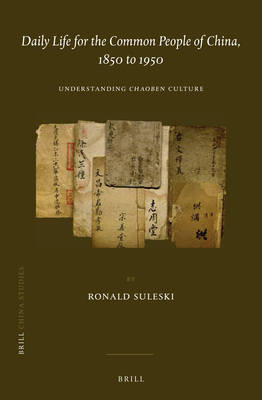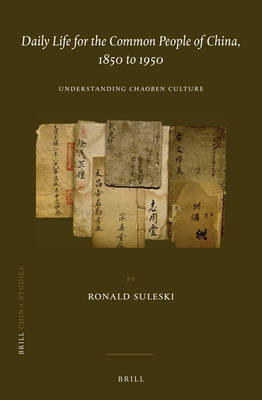
- Afhalen na 1 uur in een winkel met voorraad
- Gratis thuislevering in België vanaf € 30
- Ruim aanbod met 7 miljoen producten
- Afhalen na 1 uur in een winkel met voorraad
- Gratis thuislevering in België vanaf € 30
- Ruim aanbod met 7 miljoen producten
Zoeken
Daily Life for the Common People of China, 1850 to 1950
Understanding Chaoben Culture
Ronald Suleski
€ 363,45
+ 726 punten
Omschrijving
In this exciting book, Ronald Suleski introduces daily life for the common people of China in the century from 1850 to 1950. They were semi-literate, yet they have left us written accounts of their hopes, fears, and values. They have left us the hand-written manuscripts (chaoben 抄本) now flooding the antiques markets in China. These documents represent a new and heretofore overlooked category of historical sources.
Suleski gives a detailed explanation of the interaction of chaoben with the lives of the people. He offers examples of why they were so important to the poor laboring masses: people wanted horoscopes predicting their future, information about the ghosts causing them headaches, a few written words to help them trade in the rural markets, and many more examples are given. The book contains a special appendix giving the first complete translation into English of a chaoben describing the ghosts and goblins that bedeviled the poor working classes.
Suleski gives a detailed explanation of the interaction of chaoben with the lives of the people. He offers examples of why they were so important to the poor laboring masses: people wanted horoscopes predicting their future, information about the ghosts causing them headaches, a few written words to help them trade in the rural markets, and many more examples are given. The book contains a special appendix giving the first complete translation into English of a chaoben describing the ghosts and goblins that bedeviled the poor working classes.
Specificaties
Betrokkenen
- Auteur(s):
- Uitgeverij:
Inhoud
- Aantal bladzijden:
- 484
- Taal:
- Engels
- Reeks:
- Reeksnummer:
- nr. 39
Eigenschappen
- Productcode (EAN):
- 9789004361027
- Verschijningsdatum:
- 11/10/2018
- Uitvoering:
- Hardcover
- Formaat:
- Genaaid
- Afmetingen:
- 157 mm x 236 mm
- Gewicht:
- 839 g

Alleen bij Standaard Boekhandel
+ 726 punten op je klantenkaart van Standaard Boekhandel
Beoordelingen
We publiceren alleen reviews die voldoen aan de voorwaarden voor reviews. Bekijk onze voorwaarden voor reviews.











